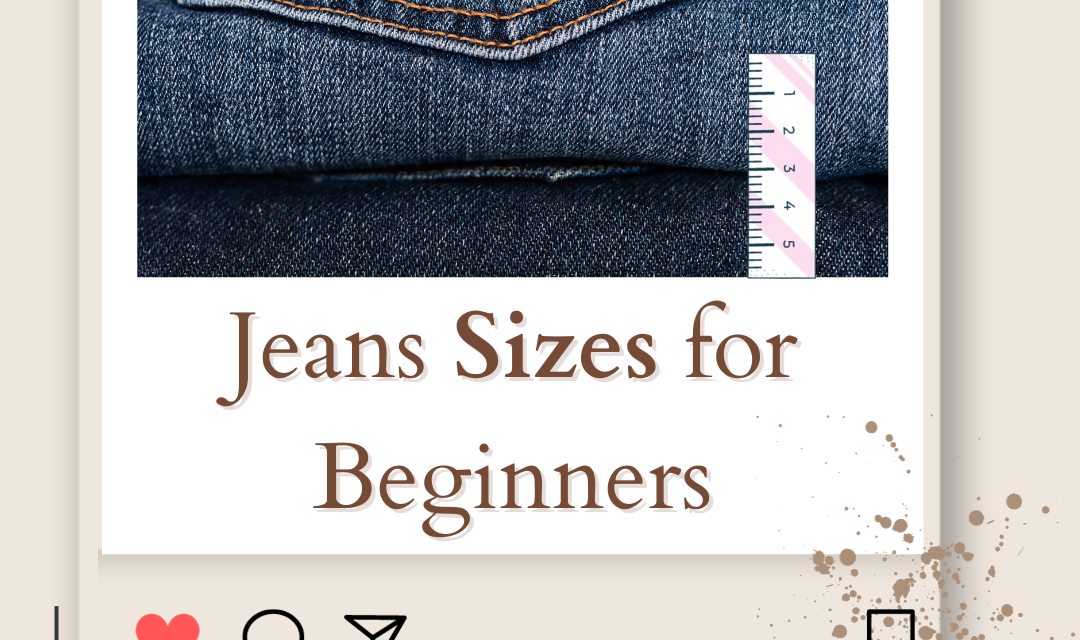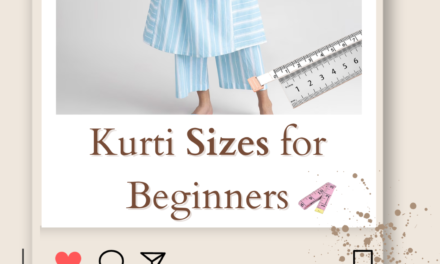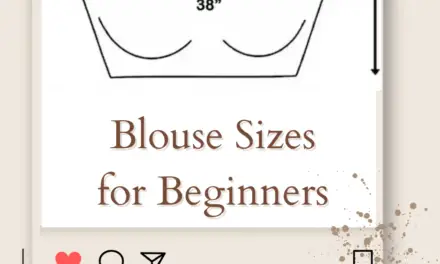Want to Know Your Jeans Sizes? Finding the perfect jeans size can be a challenge, especially for beginners. With so many different jeans brands, styles, and sizes to choose from, it’s hard to know where to start. That’s why we’ve put together this guide to help you find the perfect jeans fit.
In this guide, we’ll teach you how to measure your body, use a size chart, and find jeans that are comfortable, flattering, and stylish. We’ll also give you tips on how to avoid common jeans sizing mistakes.
Whether you’re looking for your first pair of jeans or you’re just ready for a new update, our guide will help you find the perfect pair of jeans for your needs.
Taking Accurate Jeans Measurements:
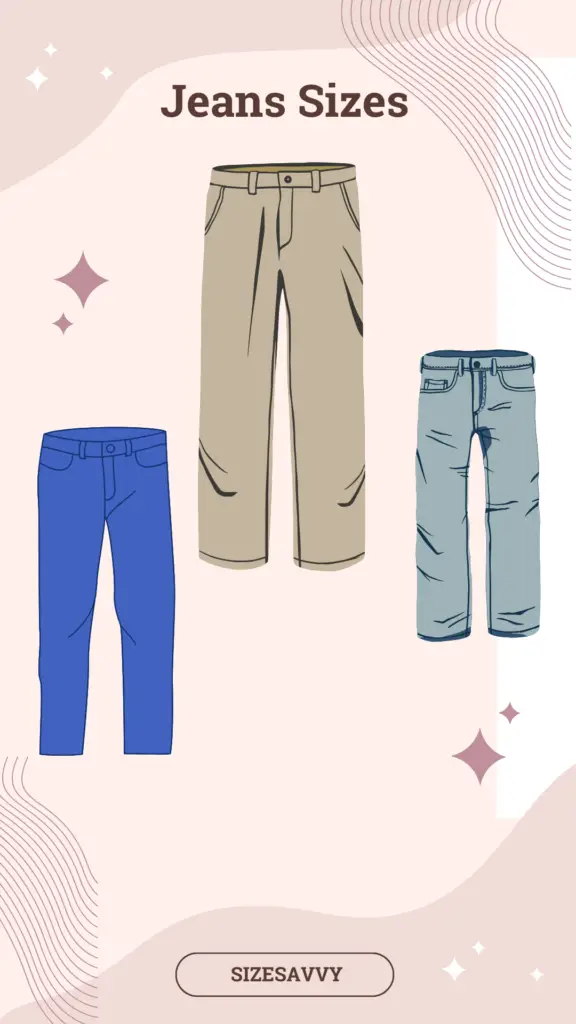
Before you start shopping, measure your waist, hips, and inseam. Use a soft measuring tape snugly but not too tight. Compare these measurements with the sizing chart provided by the brand.
Understanding Standard Jeans:
Jeans sizes typically consist of waist circumference and inseam length. For example, 30×32 means a waist size of 30 inches and an inseam length of 32 inches. Be aware that sizes may vary between brands, so always refer to the specific brand’s size chart.
Different Types of Jeans:
- Numeric Sizing: Commonly used for women’s jeans, these sizes range from 0 to 24, with 0 being the smallest size.
- Alpha Sizing: Often used in men’s jeans, these sizes are denoted by letters like S, M, L, etc., representing small, medium, large, etc.
- Petite, Regular, Tall: Denotes different lengths catering to different heights. Petite for shorter individuals, regular for average height, and tall for taller individuals.
Pro Tips for a Perfect Fit:
- Try Before You Buy: Whenever possible, try jeans before purchasing to assess the fit and comfort.
- Understand Stretch: Jeans with stretch might fit snugly at first but will loosen up. Account for this while choosing your size.
- Alterations: Don’t hesitate to get jeans tailored for a customized fit, especially for length adjustments.
Ideal jeans colors for different types of occasions:
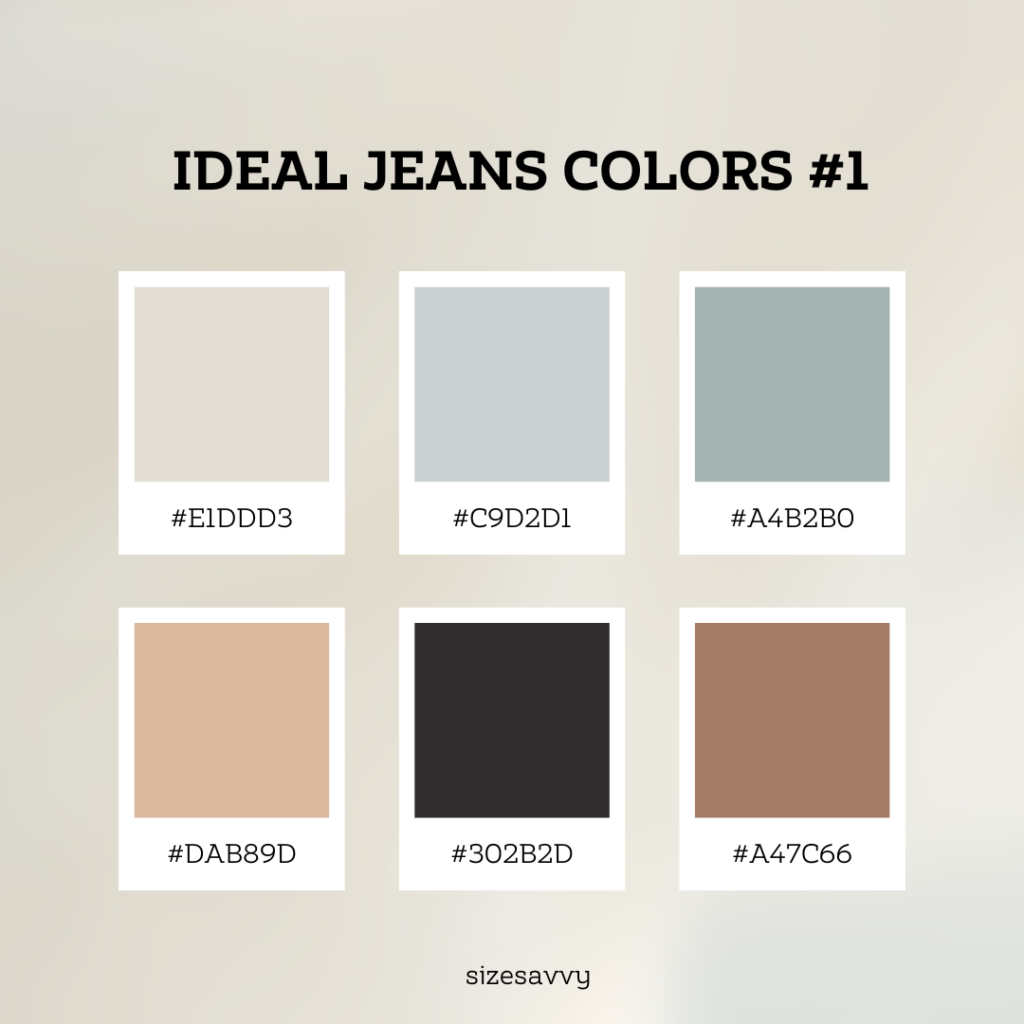
| Occasion | Ideal Jeans Colors |
| Casual Outings | Blue, Black, Light Grey, White |
| Formal Events | Dark Blue, Black, Charcoal Grey |
| Parties/Night Out | Deep Indigo, Black, Burgundy, Dark Grey |
| Outdoor Activities | Medium Blue, Dark Green, Brown |
| Summer Events | Light Blue, White, Pastel Shades |
| Work Environment | Dark Blue, Black, Charcoal Grey |
| Date Nights | Black, Dark Indigo, Wine Red |
These color suggestions provide a general guideline for jeans colors based on various occasions.
Ideal jeans materials and sizes for kids:
| Material | Recommended Size (in years) | Ideal Age Group |
| Cotton Blend | 2 – 4 years | Toddlers, Preschoolers |
| Denim | 4 – 6 years | Preschoolers, Early School |
| Stretch Denim | 6 – 8 years | School-Age Kids |
| Elastic Waistbands | 8 – 10 years | Preteens |
These measurements and materials cater to kids’ jeans, covering the ages of 2 to 10 years. However, it’s essential to consider individual body
Ideal jeans materials and sizes for teenagers:
| Material | Recommended Size (in years) | Ideal Age Group |
| Denim Blend | 10 – 12 years | Preteens, Early Teens |
| Stretch Denim | 12 – 14 years | Early Teens, Young Teens |
| Distressed Denim | 14 – 16 years | Young Teens, Late Teens |
| Skinny Jeans | 16 – 18 years | Late Teens, Young Adults |
These measurements and materials cater to teenagers’ jeans, covering the ages of 10 to 18 years.
Recommended jeans lengths for girls between 4 to 6.5 feet tall:
| Height Range | Recommended Jeans Length (in inches) |
| 4 – 4.5 feet | 28 – 30 inches |
| 4.5 – 5 feet | 30 – 32 inches |
| 5 – 5.5 feet | 32 – 34 inches |
| 5.5 – 6 feet | 34 – 36 inches |
| 6 – 6.5 feet | 36 – 38 inches |
These measurements provide a general guideline for jeans length based on height.
Choosing the right size jeans based on waist and hip:
| Waist Size (in inches) | Hip Size (in inches) | Recommended Jeans Size |
| 24 – 25 | 34 – 35 | 0 |
| 26 – 27 | 36 – 37 | 2 |
| 28 – 29 | 38 – 39 | 4 |
| 30 – 31 | 40 – 41 | 6 |
| 32 – 33 | 42 – 43 | 8 |
| 34 – 35 | 44 – 45 | 10 |
| 36 – 37 | 46 – 47 | 12 |
| 38 – 39 | 48 – 49 | 14 |
| 40 – 41 | 50 – 51 | 16 |
| 42 – 43 | 52 – 53 | 18 |
| 44 – 45 | 54 – 55 | 20 |
Please note that these sizes are indicative and may vary based on the brand’s specific sizing chart.

Things to Consider When Buying Jeans:
- Know Your Body Shape: Different styles suit different bodies. Bootcut balances curves, while straight-leg offers versatility.
- Fabric and Stretch: Look for a blend with spandex for flexibility. Classic denim softens with time.
- Choose the Right Waist: Low, mid, or high-rise? Consider comfort and style preferences.
- Check Inseam Length: Ensure the length fits your height. Brands often offer various inseam options.
- Pocket Placement: Angled back pockets enhance curves, while larger ones can add volume.
- Wash and Color: Dark hues are versatile, while distressed styles offer a casual look.
- Account for Sizing Variations: Sizes differ between brands. Refer to specific size charts and customer reviews.
- Balance Budget and Quality: Invest in quality within your budget. Well-made jeans last longer and offer better value.
General Fabric Requirement for Jeans:
General Fabric Requirements for Jeans:
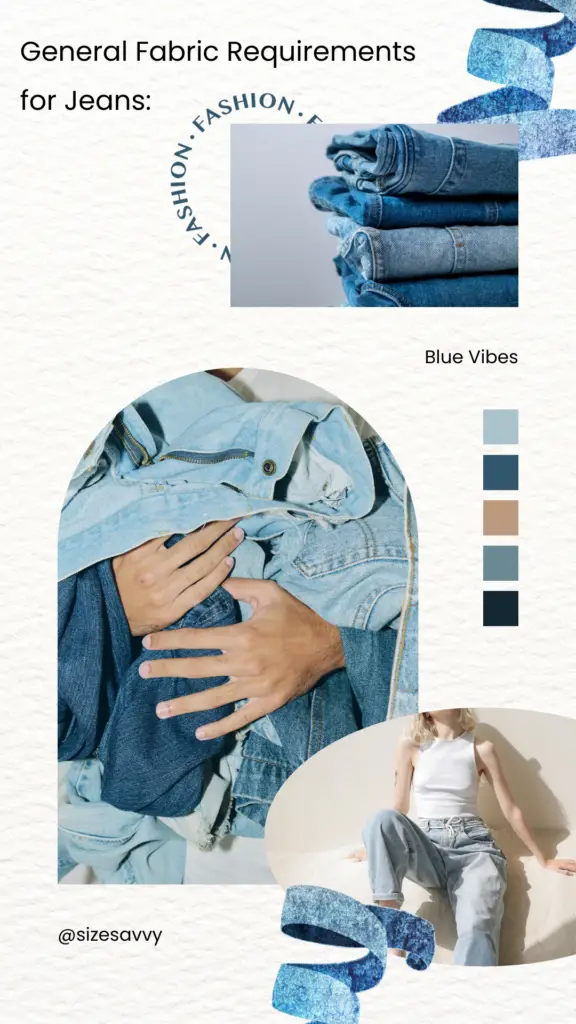
Jeans, a timeless wardrobe staple, come in various styles and fabrics tailored for different occasions and climates. Understanding the fabric requirements is essential for choosing the perfect pair. Here’s a breakdown of common denim fabrics and their ideal uses:
- Denim Weight: Denim fabrics vary in weight, typically measured in ounces per square yard (oz/yd²). Lighter denim (around 6-8 oz) is excellent for summer, providing breathability and comfort. Heavier denim (12 oz and above) offers durability, making it suitable for colder weather.
- Stretch Denim: Blended with elastane, stretch denim provides flexibility and a comfortable fit. Ideal for those who prefer a little give in their jeans, it ensures ease of movement without losing the classic denim look.
- Selvedge Denim: Known for its premium quality, selvedge denim is tightly woven on traditional shuttle looms. It features a clean, finished edge, often visible on the outseam of jeans. Selvadge denim is durable, has a classic appearance, and is favored by denim enthusiasts.
- Raw Denim: Also referred to as “dry denim,” raw denim has not undergone any pre-washing or distressing processes. Over time, it molds to the wearer’s body, creating unique fades and creases. Raw denim enthusiasts appreciate the fabric’s ability to develop a personalized, worn-in look.
- Distressed Denim: Distressed jeans are intentionally treated to achieve a worn, vintage appearance. Techniques like sanding, abrasion, and washing create distressed effects. Distressed denim offers a casual, laid-back vibe and is perfect for relaxed occasions.
- Colored Denim: Beyond the classic blue, jeans come in a spectrum of colors. Colored denim adds a playful touch to outfits and is a popular choice for casual gatherings or fashion-forward statements. The fabric weight and stretch vary, catering to diverse style preferences.
When shopping for jeans, consider the climate, occasion, and personal comfort. Each denim type offers a unique experience,
FAQs on Jeans Sizes
How do I measure myself for jeans size?
Measure your natural waistline (around your waist where you normally wear your pants) and your hips at the widest part. Compare these measurements to the sizing chart provided by the brand.
What size is a 32 in jeans?
In most sizing systems, 32 in jeans refers to the waist measurement in inches. However, sizes can vary between brands and countries, so always refer to the specific brand’s sizing chart.
What does 32 32 mean in jeans?
32 32 typically indicates a waist measurement of 32 inches and an inseam (length from crotch to bottom hem) of 32 inches. It represents waist size and leg length, respectively.
What size is 28 in jeans?
28 in jeans usually refers to the waist measurement in inches. It is a smaller size, suitable for individuals with a smaller waist.
Is size 32 medium or large?
Size 32 can be either medium or large, depending on the brand and the specific sizing range they use. Always refer to the brand’s sizing chart for accurate information.
What size is M in jeans?
M generally stands for medium in clothing sizes, including jeans. However, jean sizes can vary, so it’s crucial to refer to the specific brand’s sizing guide for precise measurements.
What size is 30 in women’s jeans?
30 in women’s jeans usually refers to the waist measurement in inches. It is a common size and can vary between small and medium, depending on the brand.
How do I know if jeans fit me?
Jeans should fit comfortably around your waist without being too tight or too loose. The legs should have the desired fit (skinny, straight, relaxed) without excessive bunching or sagging.
Are your jeans your actual waist size?
Yes, in many sizing systems, especially for men’s jeans, the number corresponds to the actual waist measurement in inches.
How do I know my jeans size in CM?
To convert inches to centimeters, multiply the number of inches by 2.54. For example, a waist size of 32 inches is approximately 81.28 cm (32 inches * 2.54 cm/inch).
What is 32 waist in cm?
A waist size of 32 inches is approximately 81.28 cm (32 inches * 2.54 cm/inch).

